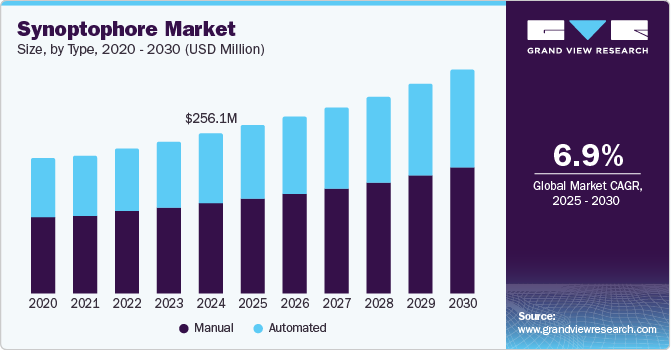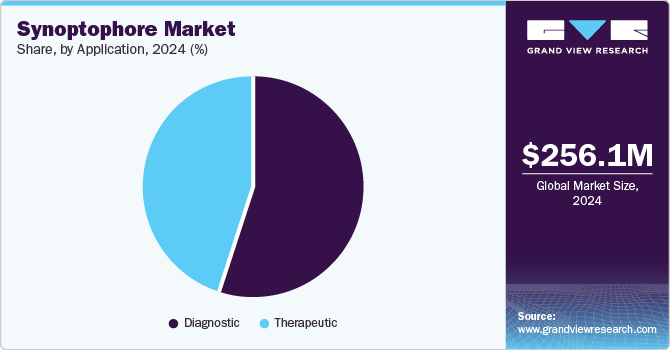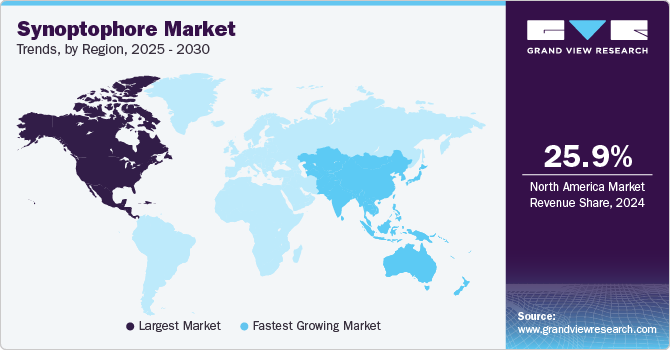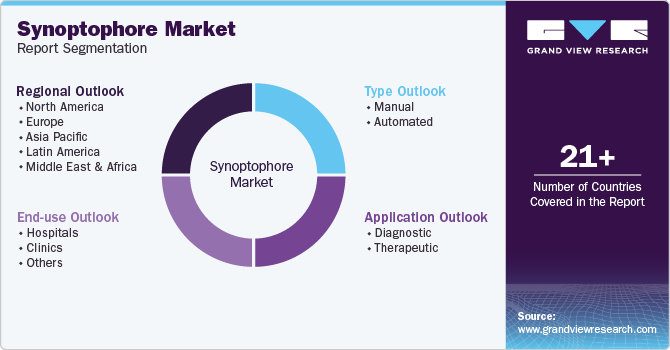- Home
- »
- Medical Devices
- »
-
Synoptophore Market Size & Share, Industry Report, 2030GVR Report cover
![Synoptophore Market Size, Share & Trends Report]()
Synoptophore Market (2025 - 2030) Size, Share & Trends Analysis Report By Type (Manual, Automated), By Application (Diagnostic, Therapeutic), By End-use (Hospitals, Clinics), By Region (North America, Europe, Asia Pacific), And Segment Forecasts
- Report ID: GVR-4-68038-981-4
- Number of Report Pages: 130
- Format: PDF
- Historical Range: 2018 - 2023
- Forecast Period: 2025 - 2030
- Industry: Healthcare
- Report Summary
- Table of Contents
- Segmentation
- Methodology
- Download FREE Sample
-
Download Sample Report
Synoptophore Market Size & Trends
The global synoptophore market was estimated at USD 256.1 million in 2024 and is projected to grow at a CAGR of 6.9% from 2025 to 2030. This growth is largely driven by the increasing prevalence of visual acuity disorders, such as strabismus and amblyopia, particularly among children and adults. Advancements in technology have significantly enhanced the functionality and accuracy of synoptophore devices, making them more attractive to healthcare providers. In addition, there is a growing awareness of the importance of early detection and intervention in eye care, leading more individuals to seek out these diagnostic tools. The preference for noninvasive treatment options over surgical procedures has further solidified the role of synoptophore devices in modern ophthalmic practice, ensuring they remain integral to effective visual disorder management.

The rising incidence of visual acuity disorders among children and adults drives demand for effective diagnostic solutions. As healthcare providers increasingly recognize the value of early intervention in managing these conditions, the utilization rate of synoptophore devices is expected to rise. In addition, there is a significant shift toward noninvasive procedures that align with patient preferences for less invasive healthcare options, making synoptophore devices more appealing. Improvements in healthcare infrastructure, particularly in developing regions, are expected to enhance access to these diagnostic tools, fostering synoptophore industry expansion.
Furthermore, as healthcare systems worldwide continue to evolve, there is an increasing emphasis on integrating advanced diagnostic tools into routine eye care practices. For instance, the World Health Organization reports that approximately 285 million people live with some form of visual impairment globally, highlighting a critical need for effective diagnostic solutions such as synoptophores. As awareness regarding visual health increases and healthcare providers adopt more comprehensive approaches to eye care, the demand for synoptophore devices is expected to grow significantly, ensuring their integral role in managing visual disorders effectively.
Type Insights
The manual segment dominated the market with a revenue share of 56.5% in 2024, driven by its cost-effectiveness and widespread availability. Manual synoptophores are often preferred due to their lower maintenance costs and ease of use, making them suitable for various healthcare settings, especially in developing regions. The familiarity of healthcare professionals with manual devices further contributes to their sustained demand. The simplicity of manual operation allows for effective training and implementation in clinics and hospitals. This established presence in the synoptophore industry ensures that manual synoptophores continue to play a significant role in diagnosing visual disorders.
The automated segment is projected to grow at a CAGR of 6.0% over the forecast period, fueled by technological advancements and increasing efficiency. Automated synoptophores offer enhanced accuracy and speed in visual assessments, reducing the time required for diagnosis and treatment. The growing trend toward digitalization in healthcare is also driving the adoption of these devices, as they integrate seamlessly with electronic health records and other digital tools. Furthermore, the demand for noninvasive procedures is rising, leading to a preference for automated solutions that minimize patient discomfort. Hence, healthcare providers seek to improve patient outcomes, automated synoptophores are becoming essential to modern ophthalmic care in the synoptophore industry.
Application Insights
The diagnostic segment dominated the market, with the largest revenue share in 2024, which can be attributed to its critical role in identifying visual disorders. Synoptophores are widely used for comprehensive assessments of ocular muscle imbalances and binocular vision issues, making them indispensable tools in ophthalmology. The ability to conduct detailed sensory and motor fusion tests enhances their utility in diagnosing conditions such as strabismus and amblyopia. Moreover, as awareness of visual health increases among patients and practitioners, the demand for effective diagnostic tools continues to rise. This trend positions the diagnostic application as a cornerstone of the synoptophore industry.

The therapeutic segment is projected to grow significantly over the forecast period due to increasing recognition of noninvasive treatment options. As more patients seek alternatives to surgical interventions for visual disorders, therapeutic applications of synoptophores gain prominence. These devices facilitate effective treatment strategies for amblyopia through targeted therapy sessions that improve visual function. In addition, advancements in therapeutic techniques using synoptophores are expected to enhance patient compliance and satisfaction. As healthcare providers increasingly adopt these innovative approaches, the therapeutic segment will likely experience robust growth.
End-use Insights
The Hospitals segment dominated the market with the largest revenue share in 2024, driven by the high volume of patients requiring eye care services. Hospitals typically have more resources to invest in advanced diagnostic equipment, ensuring they can provide comprehensive eye examinations and treatments. The presence of specialized ophthalmology departments within hospitals further supports this dominance, as they require reliable tools for accurate diagnoses. In addition, hospitals often serve as referral centers for complex cases, lead to increasing utilization of synoptophore devices. This trend solidifies hospitals position as key players in the synoptophore industry.
The clinics segment is projected to grow at the highest CAGR over the forecast period, fueled by an increasing number of outpatient eye care facilities. As awareness about eye health rises, more clinics are being established to provide specialized services for visual disorders. These clinics often focus on noninvasive treatments and early diagnosis, aligning well with the capabilities of synoptophore devices. Furthermore, technological advancements make it feasible for smaller clinics to acquire automated systems that enhance their service offerings. This growth reflects a broader trend toward accessible eye care solutions outside traditional hospital settings.
Regional Insights
North America synoptophore market dominated the global market with a revenue share of 25.9% in 2024, driven by a combination of advanced healthcare infrastructure and high prevalence rates of visual disorders. The region's robust healthcare system supports significant investments in ophthalmic technologies, ensuring that cutting-edge devices are readily available for diagnosis and treatment. The rising awareness about visual health among consumers contributes to increasing demand for effective diagnostic tools such as synoptophores. The presence of key market players further strengthens North America position as a leader in this sector.

U.S. Synoptophore Market Trends
The U.S. synoptophore market dominates North America, with a significant revenue share in 2024, fueled by its well-established healthcare system and high rates of strabismus and amblyopia among children. The emphasis on early detection has led to increased screenings and interventions across pediatric populations, driving demand for synoptophore devices. Moreover, ongoing research initiatives to improve treatment methodologies further boost market growth in this region. For instance, according to the American Academy of Ophthalmology, approximately 1-5% of the global population suffers from amblyopia, underscoring the need for effective diagnostic solutions.
Europe Synoptophore Market Trends
Europe synoptophore market held a substantial share in 2024 due to an aging population prone to various ocular disorders requiring effective diagnosis and treatment solutions. The region strong emphasis on research and development fosters innovation within ophthalmic technologies, including advancements in synoptophore devices. In additional, Europe healthcare systems prioritize patient centered care approaches that emphasize early diagnosis and noninvasive treatments. This focus aligns well with the capabilities offered by synoptophores, ensuring continued growth within this segment as awareness about eye health rises among consumers across Europe.
Asia Pacific Synoptophore Market Trends
Asia Pacific synoptophore market is expected to register the highest CAGR of 8.6% over the forecast period, which can be attributed to rising awareness about visual health and increasing investments in healthcare infrastructure. As countries within this region prioritize improving access to eye care services, there is a growing demand for advanced diagnostic tools such as synoptophores. Increasing urbanization leads to higher incidences of visual disorders due to lifestyle changes, further fueling market growth. This trend reflects a broader commitment across Asia Pacific countries to enhanced synoptophore market.
The China synoptophore market dominates the Asia Pacific, with a significant revenue share in 2024 due to its large population base and increasing prevalence of visual acuity disorders. The Chinese government has been actively promoting initiatives to improve eye health services across urban and rural areas. Furthermore, technological advancements have made it easier for healthcare providers to adopt modern diagnostic equipment such as synoptophores. This combination of factors positions China as a leader within the Asia Pacific region synoptophore market.
Key Synoptophore Company Insights
Some key companies operating in the market include Prkamya Visions, 66 Vision Tech Co., Ltd., cnlink-group.com, Nanjing Redsun Optical Co., Ltd., and Gem Optical Instruments Industries. Companies are undertaking strategic initiatives such as mergers, acquisitions, and product launches, to expand their market presence and address the evolving healthcaredemands in synoptophore market.
-
Prkamya Visions offers advanced diagnostic and therapeutic devices for visual disorders. Its product range includes manual and automated synoptophore systems that effectively assess and treat conditions such as strabismus and amblyopia. The company prioritizes noninvasive treatment options, enhancing patient comfort and outcomes through continuous innovation and development in ophthalmic care solutions.
-
66 Vision Tech Co., Ltd. offers a range of products and solutions. Its product offerings include manual and automated synoptophore systems, slit lamp microscopes, surgical microscopes, retinal cameras, and various medical instruments designed for diagnosing and treating visual disorders such as strabismus and amblyopia. Its flagship product is the YZ23B Synoptophore, specifically engineered for comprehensive binocular vision assessments.
Key Synoptophore Companies:
The following are the leading companies in the synoptophore market. These companies collectively hold the largest market share and dictate industry trends.
- Prkamya Visions
- 66 Vision Tech Co., Ltd.
- cnlink-group.com
- Nanjing Redsun Optical Co., Ltd.
- Gem Optical Instruments Industries
- haag-streit.com
- Takagi Seiko Co., Ltd.
- Appasamy Associates Private Limited
- Rumax International Private Limited
- DAHLGREN INDIA PRIVATE LIMITED
Recent Developments
-
In September 2024, Haag-Streit launched METIS, a comprehensive ophthalmic surgical control center that integrates various surgical technologies into a single platform. This innovative system is designed to streamline surgical workflows, enhance team communication, and improve patient outcomes.
-
In May 2022, Takagi Seiko Co., Ltd. launched a 2ZL-BG slit lamp microscope featuring an OM-6 flat base. This new model is designed to enhance the examination experience for eye care professionals by providing superior optics and improved ease of use.
Synoptophore Market Report Scope
Report Attribute
Details
Market size value in 2025
USD 269.2 million
Revenue forecast in 2030
USD 358.4 million
Growth rate
CAGR of 6.9% from 2025 to 2030
Base year for estimation
2024
Historical data
2018 - 2023
Forecast period
2025 - 2030
Quantitative units
Revenue in USD million and CAGR from 2025 to 2030
Report coverage
Revenue forecast, company ranking, competitive landscape, growth factors, trends
Segments covered
Type,application, end-use, region
Regional scope
North America; Europe; Asia Pacific; Latin America; Middle East & Africa
Country scope
U.S., Canada, Mexico, UK, Germany, France, Italy, Spain, Norway, Denmark, Sweden,Japan, China, India, South Korea, Australia, Thailand, Brazil, Argentina, South Africa, Saudi Arabia, UAE, Kuwait
Key companies profiled
Prkamya Visions; 66 Vision Tech Co., Ltd.; cnlink-group.com; Nanjing Redsun Optical Co., Ltd.; Gem Optical Instruments Industries; haag-streit.com; Takagi Seiko Co., Ltd.; Appasamy Associates Private Limited; Rumax International Private Limited; DAHLGREN INDIA PRIVATE LIMITED
Customization scope
Free report customization (equivalent up to 8 analysts working days) with purchase. Addition or alteration to country, regional & segment scope.
Pricing and purchase options
Avail customized purchase options to meet your exact research needs. Explore purchase options
Global Synoptophore Market Report Segmentation
This report forecasts global, regional, and country revenue growth and analyzes the latest industry trends in each sub-segment from 2018 to 2030. For this study, Grand View Research has segmented the global synoptophore market report based on type, application, end-use, and region:

-
Type Outlook (Revenue, USD Million, 2018 - 2030)
-
Manual
-
Automated
-
-
Application Outlook (Revenue, USD Million, 2018 - 2030)
-
Diagnostic
-
Therapeutic
-
-
End-use Outlook (Revenue, USD Million, 2018 - 2030)
-
Hospitals
-
Clinics
-
Others
-
-
Regional Outlook (Revenue, USD Million, 2018 - 2030)
-
North America
-
U.S.
-
Canada
-
Mexico
-
-
Europe
-
UK
-
Germany
-
France
-
Italy
-
Spain
-
Norway
-
Denmark
-
Sweden
-
-
Asia Pacific
-
Japan
-
China
-
India
-
South Korea
-
Australia
-
Thailand
-
-
Latin America
-
Brazil
-
Argentina
-
-
Middle East & Africa
-
South Africa
-
Saudi Arabia
-
UAE
-
Kuwait
-
-
Share this report with your colleague or friend.
Need a Tailored Report?
Customize this report to your needs — add regions, segments, or data points, with 20% free customization.

ISO 9001:2015 & 27001:2022 Certified
We are GDPR and CCPA compliant! Your transaction & personal information is safe and secure. For more details, please read our privacy policy.
Trusted market insights - try a free sample
See how our reports are structured and why industry leaders rely on Grand View Research. Get a free sample or ask us to tailor this report to your needs.










